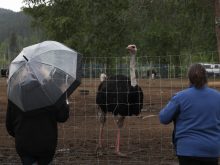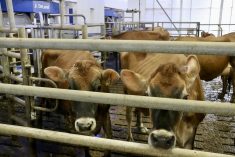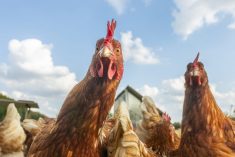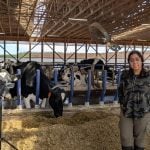Feather industry officials are calling for “extreme caution” among poultry farmers after cases of highly pathogenic avian influenza turned up at two southern Ontario properties in the past week.
The Canadian Food Inspection Agency said it has confirmed cases of the virus detected last Friday in a backyard poultry flock in the municipality of Chatham-Kent, about 80 km west of Windsor, and Tuesday this week in a commercial poultry barn in the township of West Lincoln, about 35 km southeast of Hamilton.
The CFIA set up restricted zones around the affected properties this week on Monday and Thursday respectively.
Read Also

Mexico agriculture secretary says still no date for restarting cattle exports to U.S.
Mexican Agriculture Minister Julio Berdegue said on Wednesday that Mexico and the United States have not yet set a date to resume Mexican cattle exports amid an outbreak of the flesh-eating screwworm parasite.
The Ontario cases were two of just three to have been confirmed in domestic birds in Canada since early February; the third was in a backyard poultry flock in southern Nova Scotia’s Yarmouth County, detected March 4.
Ontario’s Feather Board Command Centre, which monitors disease outbreaks on behalf of the province’s poultry and egg producer groups, said Thursday it will begin hosting weekly Zoom calls for producers and industry personnel starting next Wednesday (March 22).
Meanwhile, the FBCC urged producers and backyard flock owners to keep poultry away from areas frequented by wild birds; keep “strict control” over access to poultry houses and premises; clean and disinfect equipment before taking it into poultry houses; change footwear when entering a CFIA-designated restricted area; not wear contaminated clothes in production areas; and keep dead birds in secure, covered containers until they’re moved to a disposal area or off-farm.
Skunks
As of Wednesday, CFIA has estimated the number of domestic birds impacted by high-path H5N1 avian flu outbreaks in Canada since December 2021 at 7.184 million.
Of those, just over half were in British Columbia, which saw a lengthy run of outbreaks, mainly at commercial barns in the Fraser Valley, between mid-November 2022 and mid-January this year.
While B.C. hasn’t booked any new cases in domestic birds since Jan. 22, provincial officials on Monday did confirm the H5N1 virus in eight dead skunks found in residential areas of Vancouver and Richmond.
The province on Monday advised people who encounter dead skunks in those cities to leave the animals where they are and contact the B.C. Wildlife Health Program at 250-751-7246.
Influenza in skunks is considered to be a low risk to human health, officials said in a release, adding that the animals “may have contracted influenza by scavenging infected wild birds.”
According to CFIA, there’s no evidence to suggest that eating cooked poultry or eggs could transmit high-path avian flu to people.
Canada has seen outbreaks in domestic commercial and backyard birds at 302 premises in nine provinces since high-path H5N1 began its run through North America in late 2021. Of those premises, 231 have since been released from federal quarantine.
In the U.S., officials estimate about 58.62 million domestic birds have been impacted in 799 flocks in 47 states since high-path H5N1 outbreaks began there in early 2022. The U.S. Department of Agriculture has reported 22 outbreaks so far this month, with the bulk of affected birds at commercial poultry barns in Pennsylvania’s Lancaster County.
Further south, authorities in Chile on Monday reported that country’s first outbreak of avian flu in domestic poultry. Argentina reported its first case in poultry on Feb. 28, also after finding cases in wild birds. Bolivia, Peru and Ecuador have also seen cases in commercial barns in recent months. — Glacier FarmMedia Network













